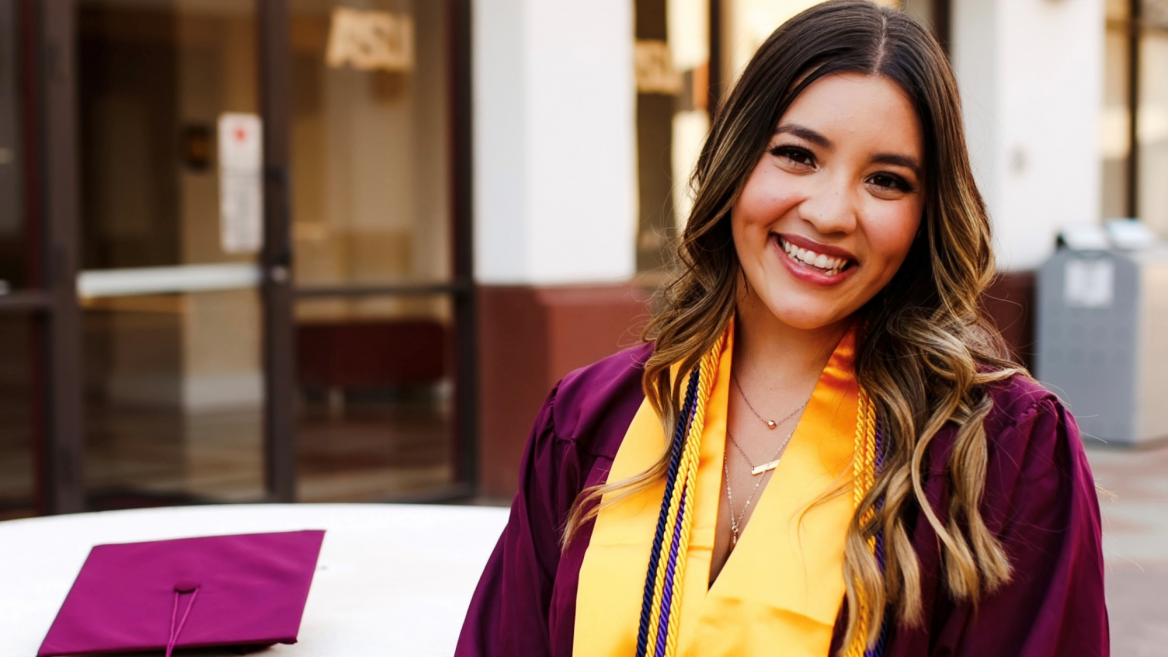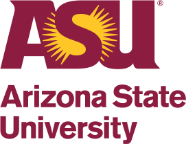
Nursing grad credits family and friends for getting her to the finish line
By
—
Editor's note: This story is part of a series of profiles of notable spring 2022 graduates.
At just 12 years old, Ana “Juli” Rincon got her first glimpse of what a future in health care could look like. The Tucson native volunteered at a nonprofit organization that specialized in integrative care for children living with chronic illnesses and their families.
“They provide healing modalities such as reiki, massage therapy, chiropractic work and various other non-invasive healing modalities, not only to the kiddos, but also their families,” said Rincon. “This includes their caregivers and siblings. Their model is whole-person, whole-family and whole-community care.”
Six years later, Rincon started pursuing a degree in nursing from Arizona State University’s Edson College of Nursing and Health Innovation. Her time volunteering helped inspire her major and the minor she chose. This spring, Rincon, who is also a student in Barrett, The Honors College, will graduate with her Bachelor of Science in nursing and a minor in integrative health. Her honor’s thesis blended both of her passions: Rincon implemented a student-led holistic nurses chapter on campus, partnering with a national organization called the American Holistic Nursing Association.
“We created a chapter with two initiatives: One of them is our talking circles, which are basically student-led support groups,” explained Rincon. “And we can talk about anything from stressing about a test to stressing about a relationship.”
The second initiative focused on wellness workshops. The chapter partnered with local specialists including a reiki therapist, herbalist and yoga instructor to share their different modalities.
“It’s really about being able to relate to each other and building a community,” said Rincon.
Rincon’s list of accomplishments while at ASU is long and impressive — even more so when you learn that in the fall, she was dealing with severe depression and graduation was the last thing on her mind.
“I lost my best friend in 2020 to fentanyl poisoning, and I think everything kind of just started piling up,” said Rincon. “My family dropped everything and came to stay with me. They helped get me into therapy, picked up groceries and cooked for me, so I could focus on myself.”
Rincon’s friends also stepped up, making sure to check on her and let her know they were there for her whenever she needed them.
“I owe a lot of my success to my support system and the help they gave me when I was at my lowest. I’m very grateful for them.”
After that experience, Rincon is more acutely aware of the mental health challenges her peers and others are facing and shares in this Q&A that that’s the problem she would tackle if given $40 million.
She also reflects on her time at ASU and her plans for the future, which is looking brighter than ever.
Question: What’s something you learned while at ASU — in the classroom or otherwise — that surprised you or changed your perspective?
Answer: I didn’t know that I was going to have the continuous opportunity to collaborate with students from other majors, and I would say it has been a highlight of my curriculum at ASU. We’ve had more focus on the importance of interprofessional collaboration. We’ve had the opportunity to collaborate with respiratory therapists, pre-med students and social work students.
I think amidst this pandemic, it has become more obvious, to the general population across the country and across the globe, that in order to have more long-term optimal health outcomes we need to work together to address all aspects of the patient.
I’ve loved being able to collaborate with other students from different health majors because you learn from each other. The way a nurse thinks is very different from the way a doctor thinks, and it’s fun to bounce off of each other. As a nurse, you spend the most time with your patient out of the health care team so you have an insight that not a lot of other members have. You really are that patient advocate, and it has been a very humbling experience.
Q: Why did you choose ASU?
A: I actually chose to come to ASU because of the honors program. Even though I was really interested in a nursing career, I loved the idea of being able to explore other fields as well within the honors program.
I loved sitting in on the courses and being able to think more philosophically rather than in the traditional logical scientific aspect of nursing. I think that has actually helped me shape a little bit more of who I am specifically as a nurse. Even though it’s a science-based field, I’m able to tie in the more humanitarian, emotional aspect of health care as well.
Q: Which professor taught you the most important lesson while at ASU?
A: I’ve been fortunate to have so many great faculty during my time at ASU, but I would have to say Dr. Dawn Augusta, who was also my thesis adviser. She’s been an amazing mentor, having started out as a nurse and then moving into integrative health and education. She’s also one of the most empathetic people I’ve ever met.
I actually looked forward to going to office hours with her because no matter what was going on outside those doors, however stressed I was, I would walk in there and just sigh, like I was just relaxed. And before jumping into anything, she would say, “How are you? How are you really doing?” And I could feel her actually listening and actually caring about who I was, not simply as her student, but as a human being.
And that’s something I learned from her: We’re all human and we all have struggles going on, so being able to respect each other and hear each other goes a long way toward us living in harmony. It’s a huge life lesson for sure.
Q: What’s the best piece of advice you’d give to those still in school?
A: In regard to a nursing program, it’s such a rigorous major, so I would encourage students to remember to take advantage of other activities. I’m not saying you have to pursue a minor or anything, but if you have the opportunity to take a course in something that you’re very passionate about, do it.
I think to become a successful nurse it’s important to make sure that we’re enjoying our lives, that we have a good quality of life — especially during college, when it’s the perfect time to try new things and experience different adventures. So I would say take advantage, join the club or take a fun class, and do something for yourself that isn’t just about your professional journey.
Q: What are your plans after graduation?
A: I’ve spent the majority of my nursing training at the Mayo Clinic, as I was a part of the Mayo cohort, and I have loved my journey there. I’ve met and learned from an amazing group of nurses, and so I hope to work there as a new grad under the nurse residency program.
My long-term goals include applying to the Peace Corps in Central or South America because I’m bilingual. My first language is Spanish, so I would love to be able to utilize that skill and practice nursing in Spanish-speaking countries.
Q: If someone gave you $40 million to solve one problem on our planet, what would you tackle?
A: Oh, hands down mental health. There is such a need in so many different aspects. There are financial barriers, lack of access, awareness and insurance not covering treatment. There’s still a gap in how mental health illness is viewed in comparison to a physical, or chronic conditions, even though mental health can be completely and utterly debilitating to the individual. So I would focus my efforts there.
